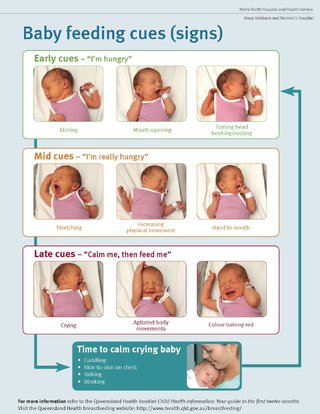Many new mothers worry about overfeeding their breastfed babies. Do not worry if your baby is feeding a lot. It's normal for newborn babies to feed very often.
There is no need to time your baby's feeds. But a newborn baby will usually breastfeed for about 10 to 40 minutes every 1.5 to 3 hours. This is because your baby’s tummy is tiny and breast milk is easily digested.
Supply and demand
Breastfeeding works on a supply and demand system. The more your baby drinks, the more milk there will be. Unless your baby is very sleepy or ill and not feeding enough, you can trust your baby to know what they need.
Your baby will let you know when they are getting hungry, and also when they are full. You should watch your baby, not the clock. Look for those early signs that it's time to attach your baby to the breast.
Feeding your baby: the first few days
Signs that your baby is hungry
Early signs include:
- sucking on their fist
- licking their lips, or making a sucking motion
- turning towards you with their mouth open
Crying is a late sign of hunger. Try not to let it get to this stage if you can. It's much easier to feed a calm baby.

Signs that your baby is full
After a good feed (20 to 40 minutes active breastfeeding), your baby will usually either:
- detach themselves from your breast
- fall asleep at your breast
Your baby has decided not to drink any more milk for now. This is how your baby learns what being full feels like and so is unlikely to overfeed.
Timing breastfeeds
There is no need to time how long your baby feeds at each breast. Allow your baby to stay on the first breast for as long as they are feeding. Then take a break, wind your baby if needed and offer the second breast. Many babies can wind themselves while in laid back or upright breastfeeding positions.
Some babies only take 1 breast per feed. Not all will need feeding from the second breast. If the last feed was short, you can return your baby to the first breast.
Weight gain
It is a common concern that exclusively breastfed babies are chunky. This is usually normal and just your baby’s own growth pattern. Often these chunky babies become very lean and light when they start to crawl, walk and run.
Finding support
Non-urgent advice: Speak to your doctor or public health nurse if:
- you are concerned about your milk supply
- you're concerned about your baby’s weight gain
- you're experiencing pain
For help with any breastfeeding problems, you can contact the following people:
- your public health nurse (PHN)
- a breastfeeding counsellor
- an online lactation consultant